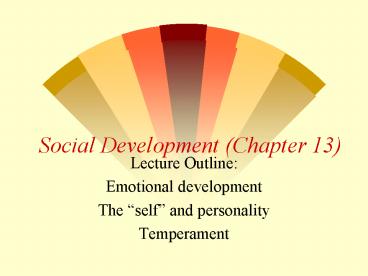Social Development (Chapter 13) - PowerPoint PPT Presentation
Title:
Social Development (Chapter 13)
Description:
Social Development (Chapter 13) Lecture Outline: Emotional development The self and personality Temperament Differentiation theory Other theories of emotion ... – PowerPoint PPT presentation
Number of Views:106
Avg rating:3.0/5.0
Title: Social Development (Chapter 13)
1
Social Development (Chapter 13)
- Lecture Outline
- Emotional development
- The self and personality
- Temperament
2
Differentiation theory
Excitement
Positive emotions
Negative Emotions
surprise
sad
pain
joy
anger
interest
3
Other theories of emotion
- Discrete emotions theory
- Innately disposed to experience emotions
- Behavioral and cognitive approaches
- Emotions are learned through experience and
represented cognitively - Labels are applied to physiological states Eat
two chocolate bars and go to the movies
4
Paul Ekman Facial Action Coding
5
Which of these neutral faces do you prefer? A,
B, or C?
6
Emotions have adaptive evolutionary function
- Joy About to achieve a goal
- Anger Confronted by an obstacle
- Sadness A goal is unattainable
- Disgust Something distasteful is happening
- All of these emotions lead to motivation for some
kind of action or reaction
7
Children must learn to read emotional cues Is
this person modeling genuine warmth or concealed
irritation?
8
The Self
- Self concept
- What am I
- Physical, active, social, psychological
components are related to progression across ages
- Self-esteem
- Evaluative component
- How valued am I?
- People internalize the evaluative judgements made
by others
9
Erik Erikson and Personality Development
- Trust vs. mistrust Birth to 1 year
- Autonomy vs. Shame and doubt (1-3)
- Initiative vs. Guilt (3-6)
- Industry vs. Inferiority (6-12)
- Identity vs. Role confusion (adolescence)
- Intimacy vs. Isolation (early adulthood)
- Generativity vs. Stagnation (middle adult)
- Integrity vs. Despair (old age)
10
(No Transcript)
11
Temperament
- Disposition, intensity, and duration of emotional
experience - Easy Playful, adaptable, regular in sleep and
eating cycles - Difficult Fusy, irregular, unadaptable to new
situations - Slow-to-warm up Avoid/ shy with novelty
- Temperamental assessment
- Behavioral observations
- Physiological reactivity
12
Goodness-of-fit person X environment interaction
Irritable Baby
Parenting Stable Unstable
Baby More Fussy Less Fussy
Parent Poor coping Good coping
Toddler Negative Happy
Fussy Calm































